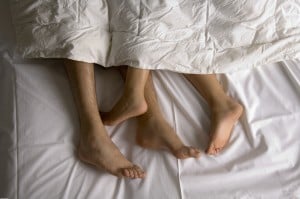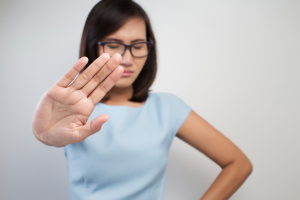“I think I masturbate more when I’m stressed.”
“You masturbate?”
This conversation I had with a male friend embodies the surprise a lot of people express when they find out I not only masturbate, but also admit it unabashedly.
Because even though this friend and I talked about sex all the time and he knew I was sexually active in my relationships, the idea that I would be sexual alone hadn’t occurred to him.
And that’s because we’re taught that women’s sexuality only exists for other people.
Ever since I discovered masturbation accidentally during childhood, it’s been something I did in response to my own desires, not a show to put on for anyone.
I don’t get into sexy poses or make seductive noises. I don’t light candles or take baths. In short, I don’t go about the process differently from the way anyone else – men included – does. And that seems to surprise people, too.
Because most depictions of women masturbating are either pornographic or part of some narrative of feminist empowerment, people are surprised when women treat masturbation as a normal, everyday activity.
Viewing masturbation habits as fundamentally different by gender contributes to the view of sexualities as fundamentally different by gender.
And when we hold this understanding, we encourage a “men are from Mars, women are from Venus (and non-binary genders don’t exist)” mentality that replaces real people with stereotypes.
We also lead society to see women as exotic creatures, rather than fellow humans to empathize with. That artificial division gets relationships off to a bad start, as does the conception of women’s sexuality as a spectacle for others, rather than an attribute intrinsic to them.
A quick note: A lot of our ideas about women and masturbation are tied up with myths about vaginas. Many of our ideas about women are wrong, many of our ideas about vaginas are wrong, and our view of the two as inherently connected is wrong.
Some myths around women, vaginas, and masturbation apply to anyone with a vagina, and some apply to anyone who identifies as a woman – but they frequently are targeted toward cis women, if only because society in general has a limited perspective.
Therefore, this article will focus on myths about cis women, because that is the experience to which I can speak. But further writing should be done about mythologies surrounding trans peoples’ masturbation habits as well – and that conversation should be situated within those experiences.
So, from my perspective, here are some myths we should all unlearn about cis women and masturbation if we want to gain a greater understanding of real women’s sexuality – and not just an exoticized and objectified version of it.
Myth #1: Women Don’t Masturbate
Most people in Western cultures assume that men masturbate. It’s not considered a polite topic to discuss, but it’s considered a normal, inevitable thing to do.
Women, not so much.
During my preteen and teen years, I felt perverted, self-indulgent, and guilty for masturbating. I didn’t tell anyone until a Truth or Dare game when I was about fifteen. It was a “truth,” and the question was, “What’s your biggest secret?”
Mine was that – gasp – I masturbated. “Me too,” said both the friends I was with. We had all been hiding it because we didn’t think it was normal.
Actually, according to one study, 92% of women ages 18-22 masturbate regularly.
But regardless of what the actual number (which can be skewed due to the very embarrassment I experienced) is, it’s very normal and nothing to be ashamed of.
Some people think of women experiencing sexual pleasure or arousal by themselves the way kids think of teachers outside of school. They don’t consider that a woman’s sexuality exists beyond their relationships.
But sexuality is intrinsic to many of us, and it can be exercised without anyone else’s participation.
Myth #2: Women’s Masturbation Is a Big Extravaganza
“Line up to get tickets everyone – she’s about to masturbate!”
Sometimes I feel like this announcement is playing every time I climb into bed. There’s such a big show made of women’s masturbation in porn and the rare movie where it’s depicted.
From Shannon Elizabeth’s sensual undressing and body caressing in American Pie to Joan Allen’s breathy gasps and ecstatic face that literally bring color to the world in Pleasantville, women’s masturbation is supposed to be a spectacle.
When men masturbate in the movies, it’s not usually optimized for the audience’s arousal or made to look dainty and beautiful. To use American Pie as an example again, Jason Biggs’ masturbation scene is depicted as embarrassing, not sexy. The porn he’s watching is supposed to be sexy, but he himself is not.
Because people believe that men masturbate in response to their own desire, whereas women do to evoke others’ desires.
The depiction of women’s masturbation as a performative act takes women out of their bodies, leading them to objectify themselves even while they masturbate – a time typically designated to be totally about ourselves and not how we look to anyone else.
As I’ve been exposed to more and more media depictions of sex, even supposedly empowering articles and videos about women’s pleasure, I’ve begun to imagine how a partner would perceive me while I masturbate, monitoring how my face looks and practicing orgasm noises even though I’m naturally silent.
This is what objectification does to us.
Of course, masturbation can be done in front of someone else. But when women are taught to think about how they look, feel, and sound in the midst of it, it takes them out of the moment and makes pleasure hard to achieve.
Unsurprisingly, 32% of women say that when they have trouble orgasming, it’s because they’re in their heads or focused on their looks. That shouldn’t be an issue ever – especially not when nobody is even watching.
Myth #3: Women Who Masturbate Are ‘Slutty’
Due to the perception that women’s self-stimulation is for other people, a woman who masturbates is perceived as sexually promiscuous, as if she’s engaging in masturbation to be like a porn star rather than simply to give herself pleasure.
In addition, due to the perception that women don’t naturally masturbate, any woman who masturbates is perceived as kinky, adventurous, or “freaky.” And if she talks about it, that’s a whole other level of kinkiness – she must be doing it to titillate men, rather than just to be honest.
When I talk about masturbation around men, I often fear they will take it as an invitation. I’ve seen men perceive openly sexual women as open to sex with anyone, due to this same view that women’s sexuality only exists for other people.
How we masturbate or talk about masturbation has nothing to do with how many sexual partners we have – in fact, some people masturbate as an alternative to partnered sex – let alone our character.
We don’t view breathing or drinking water as morally charged, and masturbation is the same: a way of fulfilling a physical need. When we assume that women who masturbate must love sex, we neglect the fact that masturbation is just a basic physical urge for many people regardless of gender.
Myth #4: Women’s Masturbation Is More Emotional
According to popular wisdom, men have quick and explicit fantasies, while women imagine themselves in loving relationships, dialogue and all, as they get themselves off. Oh, and we also light scented candles and apply body lotion to create a sensuous environment and unify our minds, bodies, and souls.
Ha!
There’s of course nothing wrong with making masturbation a profound or healing experience, but for many women, it’s as simple as spending a few minutes touching ourselves when we get into bed and then going to sleep.
And, yes, for the record, we have X-rated thoughts. We can also have some pretty weird fantasies, as I’m sure many men do. I’m frequently greeted with the thought “Where the hell did that image come from?” immediately after I finish. Ah, well – some things are better enjoyed than analyzed.
Myth #5: Women Don’t Watch Porn
This goes along with the belief that men have sexual minds, while women are pure and only enjoy sex in its most emotionally enriching form. Well, sorry to burst your bubble, but here’s some news: Women watch porn. All kinds of porn. The horror!
People love to say men are more visual, which maintains a status quo in which women’s objectification is written off as natural. This view also protects men who fear that they, themselves, will be objectified if women are, indeed, visual.
Well, we are.
According to What Do Women Want: Adventures in the Science of Female Desire by Daniel Bergner, one in three porn users is a woman, women’s eyes linger on erotic imagery in studies as much as men’s do, and cis women’s vaginas become lubricated in response to watching all kinds of sexual videos.
Unfortunately, despite many women’s affinity for adult films, most porn is geared toward heterosexual men, featuring women who are clearly not enjoying themselves, are put in potentially degrading situations, and are highlighted by the camera as the primary person to be looked at.
But times are changing, y’all. Feminist porn is a thing, and there’s demand for it.
Women aren’t all turned on by the same stuff, but one thing many women want is porn that puts women’s pleasure front and center. And that will become more and more common as we acknowledge how visual women are and get more women behind the camera rather than just in front of it.
Myth #6: Masturbation Is Innate for Men and Learned for Women
Women’s sexuality has been repressed, no doubt. Some women don’t allow themselves to explore their sexualities until later in life.
But many discover masturbation very early on.
75% of women have masturbated before age eighteen, and most women discover masturbation independently. If you don’t believe me, Nancy Friday’s books share the stories of many women who started experiencing sexual pleasure as young children.
Over the past few years, especially on my former college campus and others, I’ve noticed a growing effort among feminists and sex educators to teach women about their sexual anatomies and processes, often assuming they don’t already know.
There’s nothing wrong with educating people about their bodies, though I could stand to see this done in a less gendered manner, but such education becomes problematic when it addresses women as sexual Sleeping Beauties in need of an awakening, whether by a partner or an expert.
Once again, the assumption that women are less sexual and are sexual only with the assistance of others is rearing its head.
Some people try masturbation after learning what it is, and some stumble upon it unintentionally. But it feels patronizing to be told we need to learn the basics of how our bodies work. We need to acknowledge that many women are innately sexual and don’t need anyone else to make us that way.
Myth #7: Women Must Masturbate to Be Empowered
Alongside the narrative of women masturbating as a form of seduction, there’s one of women masturbating as a feminist statement. This latter image may seem empowering, but it actually objectifies women as well in several subtle ways.
One problematic aspect of the view of masturbation as women’s empowerment is that it’s often advocated as a way for women to feel better about their bodies. If you can turn yourself on and get yourself off, the logic goes, you will feel sexy.
But not everything a woman does needs to have anything to do with her sex appeal.
Masturbation is a personal experience that can be enjoyed even on your shittiest body image day. Nobody tells men to masturbate to feel better about their bodies because, again, men’s masturbation is not associated with their looks.
In addition, by making women’s masturbation into a political statement, we obscure the fact that it’s something many of our bodies just naturally do and contribute to the stereotype that masturbation is natural for men and learned for women.
Beyond that, though, women don’t need to masturbate to be empowered. We don’t need to do anything to be empowered. We just need to do what we want.
I appreciate the intention of feminists who advocate masturbation as a way to make a woman feel “empowered by being able to pleasure herself.” Masturbation can be a feminist act if, by doing it, you are rejecting all the bullshit you’re been taught about women’s (lack of) sexuality.
But when I get under the covers or into the shower, women’s empowerment is typically the last thing I’m thinking of. I’m just focused on my own fantasies – or at least I try to be.
When I do think about my confidence or independence due to all these narratives, these thoughts, like those that come from the objectification of women’s masturbation, are distracting. I suddenly feel pressure to feel empowered afterward rather than just physically relieved.
So let’s avoid giving women one more thing they feel like they have to do, shall we?
***
What all these myths have in common is that they take a deeply personal experience and define it for other people. Our masturbation routine is our and ours alone, and it can be whatever we make it.
People of all genders have appropriated women’s masturbation for different purposes, but ultimately, it doesn’t need to have a purpose. You don’t have to masturbate as a sexy show, a display of masculinity or femininity, or a means of emancipation. You can do it just because you feel like it.
Society and the media love to make women’s actions more than they are – and to make women more than they are. But we don’t have to be, especially in our most private moments. We are not objects or embodiments of any ideal.
For once, let’s let women be people who just are doing their thing – whatever thing that may be.
[do_widget id=’text-101′]
Suzannah Weiss is a Contributing Writer for Everyday Feminism and a New York-based writer whose work has appeared in The Washington Post, Salon, Seventeen, Buzzfeed, The Huffington Post, Bustle, and more. She holds degrees in Gender and Sexuality Studies, Modern Culture and Media, and Cognitive Neuroscience from Brown University. You can follow her on Twitter @suzannahweiss.
Search our 3000+ articles!
Read our articles about:
Our online racial justice training
Used by hundreds of universities, non-profits, and businesses.
Click to learn more





















